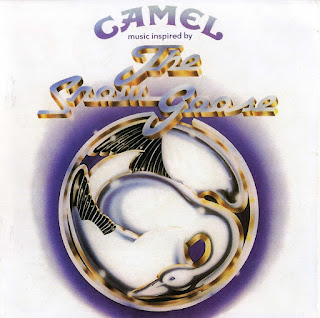The Snow Goose is the third studio album by the band Camel, released in 1975. The critical success of "The White Rider" suite (based on J. R. R. Tolkien's The Lord of the Rings and appearing on the band's previous 1974 album, Mirage) inspired the group to write more novel-inspired conceptual suites.
The band considered several novels on which to base their next album. For a time they settled on Siddhartha, by Hermann Hesse, and some songs were written before the idea was abandoned in favour of Paul Gallico's novella The Snow Goose. The album's name, originally The Snow Goose, was altered to Music Inspired by The Snow Goose to accommodate legal protests by Paul Gallico. The album was originally due to feature lyrics based on Gallico's text, but this was abandoned due to the copyright objections. The music was mostly written over a fortnight in a cottage in Devon, England.
Recording began in January 1975 at Island Studios in London with producer David Hitchcock and engineer Rhett Davies. Later overdubs were recorded at Decca Studios and engineered by John Burns. The London Symphony Orchestra participated in the recording, with David Bedford supplying the arrangements.
The 'duffle coat' on the album's credits was used by Andrew Latimer and Doug Ferguson on "Epitaph" to simulate a flapping of wings by waving it in the air.
The album was released in May 1975, eventually reaching number 22 in UK album chart that summer. It spent 13 weeks on chart and was certified silver. In the US, the album was released in July and reached No. 162. It was critically successful and sold well in Europe and Japan. and in 2014 was voted no. 31 in the Top 100 Prog Albums of All Time by readers of Prog magazine.
The album's success led to a sell-out concert at the Royal Albert Hall, London, with the London Symphony Orchestra in October 1975, which was later released as part of the live double album A Live Record (1978). The Melody Maker magazine to declare Camel to be Britain's "Brightest Hope", leading to an appearance on BBC's The Old Grey Whistle Test on 21 June 1975, (where the band performed with a woodwind section a medley of "Snow Goose" themes) and Radio One In Concert programme (22 April 1975). To promote the album Decca decided to release an edited version of "Flight of the Snow Goose/Rhayader" as a single in May.
Camel embarked on a brief tour in autumn 2013, performing The Snow Goose for the first time since the Royal Albert Hall show in 1975. Andrew Latimer was joined by Colin Bass, Denis Clement, Guy LeBlanc and Jason Hart for the tour, which marked the first time the band had played since their farewell tour.
A statement from the band for the initial show said: "The evening pays tribute to former band member Peter Bardens, who died of cancer at the same time as frontman Latimer was battling a terminal illness. Ten years later, Latimer has regained health and is willing to celebrate a career that spans over four decades. This two-set show will also embrace compositions recorded throughout those years in a personal covenant of appreciation for a deeply rewarding life of music."
Track listing
All songs by Peter Bardens and Andrew Latimer.
- "The Great Marsh" 2:02
- "Rhayader" 3:01
- "Rhayader Goes to Town" 5:19
- "Sanctuary" 1:05
- "Fritha" 1:19
- "The Snow Goose" 3:11
- "Friendship" 1:43
- "Migration" 2:01
- "Rhayader Alone" 1:50
- "Flight of the Snow Goose" 2:40
- "Preparation" 3:58
- "Dunkirk" 5:19
- "Epitaph" 2:07
- "Fritha Alone" 1:40
- "La Princesse Perdue" 4:43
- "The Great Marsh" 1:20
Bonus tracks on 2002 remaster
- "Flight of the Snow Goose" (Single edit) 2:05
- "Rhayader" (Single edit) 3:09
- "Flight of the Snow Goose" (Alternate single edit) 2:50
- "Rhayader Goes to Town" (Recorded live at The Marquee Club) 5:07
- "The Snow Goose/Freefall" (Recorded live at The Marquee Club) 11:01


























































